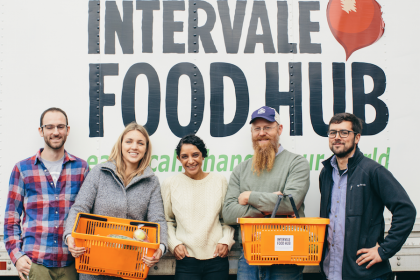
This post was originally published on Farm to Institution New England’s blog.
New England Producers are Gaining Approval to Sell Local Food to Big Institutional Buyers
Lately, we’ve heard about a number of new farm to institution ties that are making local food more readily available to schools, colleges, hospitals and other institutions in New England. In response, Farm To Institution New England put together this roundup of the latest news from producers and food distributors who have recently been approved to sell New England-grown food to large institutional food service companies and distributors such as Sodexo, Compass Group, Sysco and PFG. Join us in congratulating these small food businesses and organizations for their success!
1. Intervale Food Hub Approved as a Vendor for Sodexo at UVM
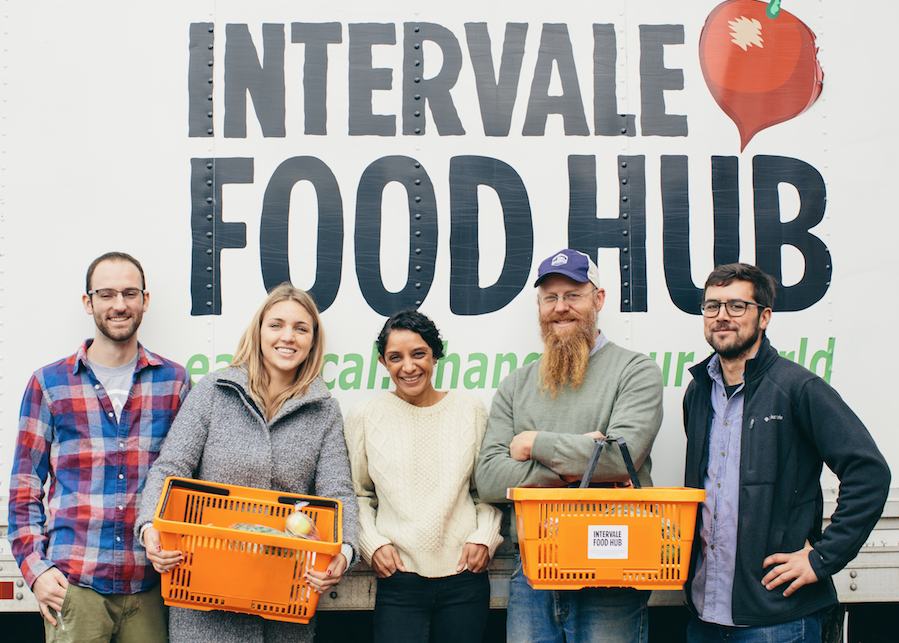 The Intervale Food Hub of Vermont, which aggregates product from a wide variety of farmers in Vermont, became an approved wholesale vendor to Sodexo at the University of Vermont this fall. The Intervale is working with the UVM residence and retail dining halls to incorporate more local food into their menus. Since September 2015, they have sold $25,000 of fresh Vermont-grown produce.
The Intervale Food Hub of Vermont, which aggregates product from a wide variety of farmers in Vermont, became an approved wholesale vendor to Sodexo at the University of Vermont this fall. The Intervale is working with the UVM residence and retail dining halls to incorporate more local food into their menus. Since September 2015, they have sold $25,000 of fresh Vermont-grown produce.
Their goal is to build on this relationship in 2016, aiming to reach $50,000 in sales for the upcoming year. They also hope to eventually reach out to other Sodexo-managed facilities in their region as well.
2. Heiwa Tofu Approved to Sell New England-Grown Organic Tofu & Soymilk to Sodexo
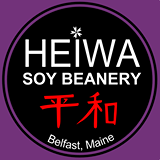 Heiwa Tofu, founded in 2008, makes MOFGA certified organic tofu and soymilk handcrafted from Maine and New England grown soybeans. The company is located in Belfast, Maine. This Fall, Heiwa became the preferred vendor for tofu for Sodexo in the state of Maine.
Heiwa Tofu, founded in 2008, makes MOFGA certified organic tofu and soymilk handcrafted from Maine and New England grown soybeans. The company is located in Belfast, Maine. This Fall, Heiwa became the preferred vendor for tofu for Sodexo in the state of Maine.
Heiwa sells to supermarkets, natural food stores, distributors, institutions, restaurants, and buyers’ clubs. At this point, over 70% of Heiwa sales are made through distributors, including Crown O’ Maine Organic Cooperative, Native Maine Produce, Dole & Bailey, Specialty Foods Boston, and Unity Food Hub. This percentage of distributed product is likely to grow in the coming years.
Heiwa began selling to institutions starting in 2008, starting with Colby College and Bowdoin College. Their products are now also distributed to the University of Maine, Maine College of Art, Central Maine Medical Center, Maine General Medical Center, University of New England, Thomas College, York County Community College, and Roger Williams University in Rhode Island. Institutional accounts and buyers are very helpful in creating more consistent year-round markets for Heiwa Tofu.
3. Red Tomato Approved as a Food Distributor for Compass Group
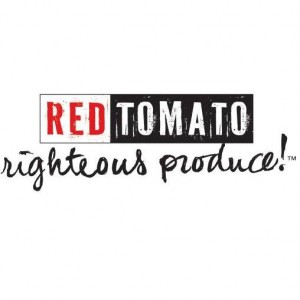 Red Tomato, a Massachusetts-based nonprofit that delivers fresh, locally sourced and sustainable fruits and vegetables, is making major inroads in serving the college and university market in New England. Red Tomato was recently approved as a vendor for Compass Group, a food service management company with accounts around the world, including many colleges and universities in southern New England.
Red Tomato, a Massachusetts-based nonprofit that delivers fresh, locally sourced and sustainable fruits and vegetables, is making major inroads in serving the college and university market in New England. Red Tomato was recently approved as a vendor for Compass Group, a food service management company with accounts around the world, including many colleges and universities in southern New England.
Red Tomato began selling to several Massachusetts universities, including Northeastern and Worcester State, when approached by a Compass Group Regional Executive Chef who was looking for a way to increase his purchases of farm-identified, locally grown produce. It was a long process involving third party audits but Red Tomato is now able to sell to institutions without them being penalized for purchasing off contract. Institutions are increasingly demanding that their distributors provide accurate and detailed information about the source of their products. Companies like Red Tomato that only distribute local foods are well positioned to fill this need.
4. Mousam Valley Mushrooms Approved to Sell Maine-Grown Mushrooms Through Sodexo and Sysco
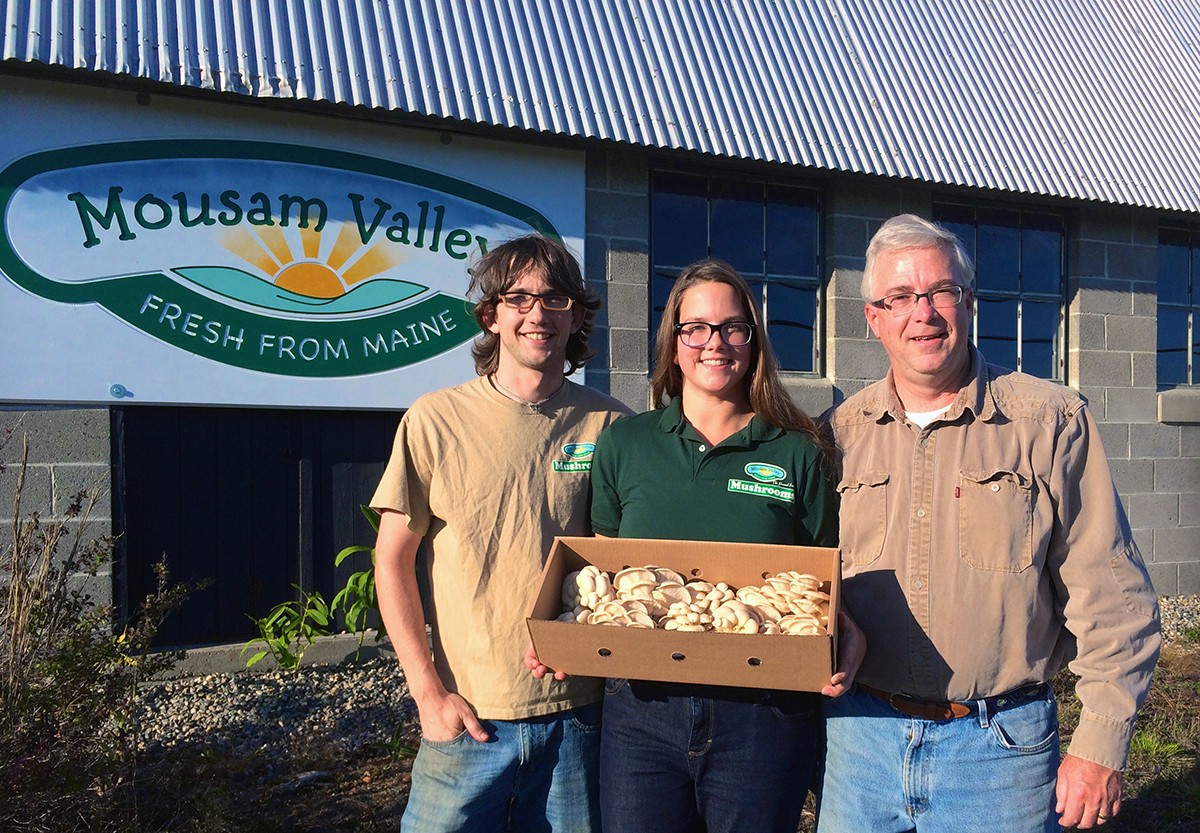 Mousam Valley Mushrooms, a family farm located in Springvale, Maine, is now a Sodexo and Sysco approved vendor. They currently sell a variety of oyster and shiitake mushrooms to various universities including Clark University and the University of Massachusetts through their newest distributor, Fresh Point, which is located in Connecticut. They have also been catering to local institutions such as Bowdoin College through their local distributor Crown o’ Maine Organic Cooperative, which is actively involved in the Maine Farm and Sea Cooperative that aims to have local food make up 30% of the University of Maine System food service by 2021. Being an approved Sodexo and Sysco vendor has given Mousam Valley Mushrooms a reason to ramp up their mushroom production from several hundred pounds per week to several hundred pounds per day!
Mousam Valley Mushrooms, a family farm located in Springvale, Maine, is now a Sodexo and Sysco approved vendor. They currently sell a variety of oyster and shiitake mushrooms to various universities including Clark University and the University of Massachusetts through their newest distributor, Fresh Point, which is located in Connecticut. They have also been catering to local institutions such as Bowdoin College through their local distributor Crown o’ Maine Organic Cooperative, which is actively involved in the Maine Farm and Sea Cooperative that aims to have local food make up 30% of the University of Maine System food service by 2021. Being an approved Sodexo and Sysco vendor has given Mousam Valley Mushrooms a reason to ramp up their mushroom production from several hundred pounds per week to several hundred pounds per day!
5. Maine Grains Now Supplying PFG with Oats, Buckwheat & Spelt
 Maine Grains now supplies Performance Foodservice Group [PFG] with stone-milled certified organic and untreated heritage whole grains and sifted flours including rolled oats, cracked oats, buckwheat, and spelt. This new partnership underscores the mill’s recent receipt of a USDA grant enabling them to gear-up to quadruple their production of rolled oats. To best accommodate the growing institutional demand for local/regional fare, Maine Grains offers the option of cracked oats, which reputedly hold-up well to the rigors of serving and steam tables. Their rolled oats deliver a fortifying breakfast favorite with stand-alone texture and robust flavor even when exposed to heat for prolonged periods of time.
Maine Grains now supplies Performance Foodservice Group [PFG] with stone-milled certified organic and untreated heritage whole grains and sifted flours including rolled oats, cracked oats, buckwheat, and spelt. This new partnership underscores the mill’s recent receipt of a USDA grant enabling them to gear-up to quadruple their production of rolled oats. To best accommodate the growing institutional demand for local/regional fare, Maine Grains offers the option of cracked oats, which reputedly hold-up well to the rigors of serving and steam tables. Their rolled oats deliver a fortifying breakfast favorite with stand-alone texture and robust flavor even when exposed to heat for prolonged periods of time.
Dining service management at the colleges Maine Grains supplies report success with their end-user discerning student populace to the extent that they’ve significantly upped their ongoing order projections going forward. College and universities rely on the oats as an easy breakfast and dessert staple, allowing institutions to increase healthy food options.
Joe Klaus, Operations Manager of Dining Services at Colby College notes another advantage to this supplier relationship, whereby oats come onto the menu just as the local growing season tapers to a close, allowing for a less dramatic drop in his ability to source fresh local food choices. January through March are the region’s most challenging months to procure from the local farms, and Maine Grains Oats serve as the ultimate bridge when other local foods are difficult to source. Oats can be readily integrated into the full spectrum of institutional settings such as primary schools, hospitals, and nursing homes.
6. US Organic Grain Collaborative Invests in Grain Farmers in Aroostook County, Maine
 The US Organic Grain Collaboration is a pre-competitive industry effort led by organic food companies that have identified the need for collaborative action to address key challenges in expanding the supply of organic grain in the US. Some of the companies involved include Clif Bar, the Organic Trade Association, Stonyfield Organic, Pete & Gerry’s Organic Eggs, Organic Valley, Annie’s Naturals, Grain Millers, Whole Foods, and Nature’s Path.
The US Organic Grain Collaboration is a pre-competitive industry effort led by organic food companies that have identified the need for collaborative action to address key challenges in expanding the supply of organic grain in the US. Some of the companies involved include Clif Bar, the Organic Trade Association, Stonyfield Organic, Pete & Gerry’s Organic Eggs, Organic Valley, Annie’s Naturals, Grain Millers, Whole Foods, and Nature’s Path.
The US Organic Grain Collaboration has identified Aroostook County, Maine as an investment opportunity because of its strong farm culture and important agricultural land base. The collaboration is committed to working with Aroostook farmers and supply chain partners to address the challenge of increasing the amount of acreage devoted to production of certified organic small grains (for food and feed) in rotation with vegetable crops (such as potatoes and broccoli).
The collaboration will focus on improving farmer profitability and strengthening market partners, aggregators and end users through technical assistance, research trials to improve varietals and rotations, identification of new markets for cash crops in the grain rotation, purchasing commitments from market partners and end-users and other strategies. If you are interested in this project, please contact Elizabeth Reaves at the Sustainable Food Lab at ereaves@sustainablefood.org.
7. Connecticut Public Schools Buy 9,000 Pounds of Farm-Direct Produce in Pilot Program
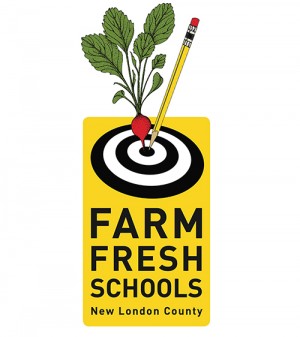 This summer, Farm Fresh New London County Schools conducted a pilot program to expand the impact of an existing farm to school processing kitchen in Norwich, Connecticut. Under the pilot, Norwich Public Schools partnered with two additional school districts, Groton Public Schools and New London Public Schools, to purchase and process six Connecticut Grown crops to serve in 27 school cafeterias throughout the 2015/16 school year. The group purchased over 9,000 pounds of produce directly from six New London County producers. The pilot was a success and the coalition of schools plan to continue and expand the efforts for the 2016 growing season.
This summer, Farm Fresh New London County Schools conducted a pilot program to expand the impact of an existing farm to school processing kitchen in Norwich, Connecticut. Under the pilot, Norwich Public Schools partnered with two additional school districts, Groton Public Schools and New London Public Schools, to purchase and process six Connecticut Grown crops to serve in 27 school cafeterias throughout the 2015/16 school year. The group purchased over 9,000 pounds of produce directly from six New London County producers. The pilot was a success and the coalition of schools plan to continue and expand the efforts for the 2016 growing season.
8. FarmersWeb Online Software Connects Farms & Institutional Buyers
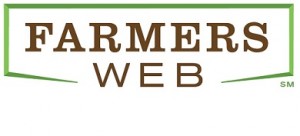 FarmersWeb is online software used by farms to manage their business and work with wholesale buyers such as schools, restaurants, corporate kitchens, caterers, and retail stores. Now available nationwide, FarmersWeb is a software solution that brings efficiency to a farm’s wholesale operations, allowing it to have a successful working relationship with its buyers.
FarmersWeb is online software used by farms to manage their business and work with wholesale buyers such as schools, restaurants, corporate kitchens, caterers, and retail stores. Now available nationwide, FarmersWeb is a software solution that brings efficiency to a farm’s wholesale operations, allowing it to have a successful working relationship with its buyers.
Farmers in FINE’s network who sell or want to sell to institutions can take advantage of FarmersWeb’s free account. This account type provides a farm with a free web page with information about the farm, its history, growing methods, categories of production, pest management, logo, picture, and contact information. With it, a farm gets an online presence without the expense or hassle of designing, developing, hosting, and maintaining their own website.
Moreover, that online presence is where buyers are already present and looking to discover farms (something a farm’s own website or Facebook page cannot provide). And it is completely free with no obligation to use the other features or account types of FarmersWeb. Additionally, the farm information can be a great resource for the institutional buyers who are seeking farm stories and logos to use in their marketing. To learn more, contact David Ross at david@farmersweb.com.
If you know of additional vendor news, send a short write-up to Kaitlin Haskins at kaitlin@farmtoinstitution.org.
Riley Neugebauer is the Farm & Sea to Campus Project Manager for Farm to Institution New England.




